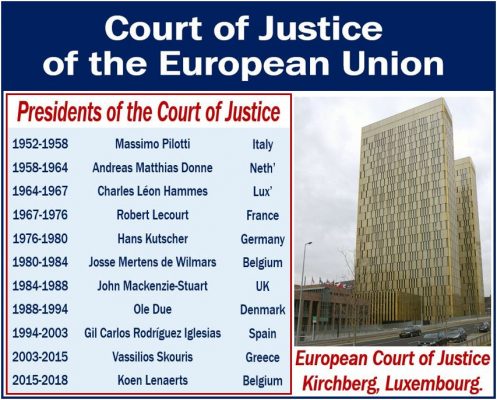The Court of Justice of the European Union ensures that every EU nation interprets EU law in the same way. We also refer to it as the European Court of Justice, CJEU, or the Court of Justice.
The Court of Justice of the European Union also ensures that Member States apply the law in the same way.
The CJEU consists of one judge from each Member State, plus eleven advocate generals. Advocate generals are senior officers who help the judges. They are responsible for presenting legal opinions on cases.
The CJEU, which has existed since 1952, is the European Union’s supreme court in matters of EU law.
The European Union
EU stands for European Union. It is an economic and political union of twenty-eight European nations.
It has developed a giant internal market through a system of standardized laws that apply to all Member States.
The EU has a population of 510 million, making it the largest consumer market in the world, in monetary terms.

Court of Justice of the European Union – disputes
The governments of EU Member States settle legal disputes at the Court of Justice. EU institutions also settle disputes at the CJEU.
Europa.eu says the following regarding some other functions of the Court of Justice:
“It can also, in certain circumstances, be used by individuals, companies or organizations to take action against an EU institution, if they feel it has somehow infringed their rights.”
EU law vs. national law
The Court of Justice of the European Union is only the highest court in matters of Union law. It is not an authority on the national law of each EU Member State.
I cannot, for example, appeal a decision of a British court to the CJEU. Rather, national courts refer questions of EU law to the CJEU.
CJEU + three other institutions
The CJEU is one of four key institutions in the European Union. Together, they run the whole Union. The four institutions are:
– The European Parliament. The European Union’s law-making body. It consists of 751 MEPs (Members of the European Parliament) that voters across the Union elect every five years.
– The European Commission. This is the European Union’s politically independent executive arm.
– The Council of the European Union. The voice of the government of the EU Member States. The Council of the EU adopts the new laws and policies of the Union.
– The Court of Justice of the European Union.
